How I Coped With Guilt After My Disordered Eating Relapse
Editor's Note
If you live with an eating disorder, the following post could be potentially triggering. You can contact the Crisis Text Line by texting “NEDA” to 741741.
I felt full. I felt sustained. I felt nurtured. I marveled over how strong I was as I realized how far I had come.
Wow, I’ve been eating enough every day.
I can’t believe that just months ago, I wasn’t.
I can finally see the light at the end of the tunnel.
I’m so proud of myself for coping healthily.
But then, just days after I fully recognized that I was stronger and healthier than ever before, the morose thoughts began to envelop my mind.
What if you aren’t enough? Not enough, not enough, not enough…
Suddenly, I felt ill-equipped to handle the darkness that suddenly overwhelmed my mind. I had been bathing in light, swimming in a golden stream of sufficiency — sufficient life, sufficient work performance, sufficient sustenance — which left me unprepared for the seemingly inevitable moment when my undeniable sense of enough would all slip away.
The hunger gnawed at me, begging me to satiate myself. The hours passed by in a haze, nondescriptly flying by until I realized that my golden streak of sustenance was over.
I had relapsed into disordered eating.
The guilt hit me sharply, poignantly, as I struggled to cope with the harsh reality of my disordered mind. I had been doing so well, eating sufficient portions, eating in front of others without reservations. The “past tense” of it all, the has, the was, struck me immediately, as I fought to shake off the overwhelming sense that I could have listened to my “rational mind” and made a healthier choice. Why had I been so hard on myself? Why couldn’t I have made a different decision? Why, why, why?
I recalled the words I had spoken to a friend, months before: “Relapses happen, and recovery is not a straight line. Think of this as a blank slate, an opportunity to start anew. Give yourself the grace to start over.”
I had not eaten, but it was not too late. I sustained myself, grateful to finally retain a sense of nourishment.
Relapses happen.
I had spent the day struggling with perfectionistic, triggering thoughts, even though my mind had remained calm the day before.
Recovery is not a straight line.
I had broken my months-long streak of coping healthily with my disordered thoughts, but I remained hopeful that I would awaken tomorrow focused on progressing forward.
Think of this as a blank slate.
I had not been kind to my mind or my body, but I could choose to forgive myself, to be gentle with my tumultuous thoughts, to give myself permission to guiltlessly begin anew.
Give yourself the grace to start over.
I have slowly begun to combat the guilt I feel over my relapse with powerful, unquellable self-love. I have stepped back on the path towards feeling full and whole, and I confront each day’s challenges as they come. I have resolved to gift myself an unending river of grace to begin again. At last, I have a blank slate, and I am eager to embrace my second chance to nurture myself.
Getty photo by Anna Ismagilova

